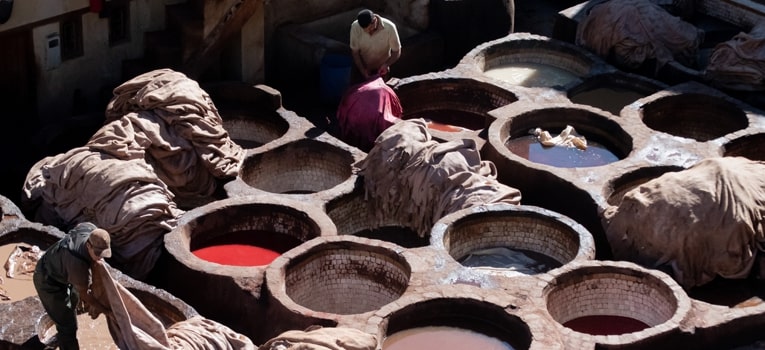Mythbusters Series: Screened Chemistry
Article
Global demand for textile chemicals is escalating, having hit 1.13 million tonnes in 2020 and forecast to reach 1.90 million tonnes by 2030.
Such growth in chemical usage and pollution is quickly turning into a third great planetary crisis according to New Scientist. It’s critical that brands look for more sustainable ways to manage their chemicals and work with facilities and chemical manufacturers in their value chain to introduce sustainability programs and environmental goals to combat this plight.
Let’s now debunk some of the misconceptions about screened chemistry programs and the responsibilities of brands, facilities and chemical manufacturers.
Myth #1 – “Brands cannot be held responsible if other parts of the value chain don’t want to participate in a screened chemical program.”
Our take on it: Currently each facility can choose to screen their chemical usage. However, brands can also choose to work only with suppliers that meet their standards and brand promises. Brands have a responsibility to ensure participation from their facilities in screened chemistry programs and shouldn’t turn a blind eye. If the lack of participation lies with a chemical manufacturer, facilities can get support from ToxServices and Scivera when forwarding a screening request to the chemical manufacturer. In the case that the chemical manufacturer does not agree to screen the product:
- Brands should support the facility by approaching the chemical manufacturer together to request the screening or
- Seek an alternative solution that serves the required need and is screened or
- Approach chemical manufacturers that offer a similar product who are willing to screen the product
CleanChain’s Solution: CleanChain supports the whole value chain to make improvements, increase transparency and work together to meet environmental promises. Brands, facilities and chemical manufacturers can all log in to the same platform, upload data and see reports.
Myth #2 – “It’s more cost-effective to stick with the chemical manufacturers I already use, even if they don’t screen all their chemicals.”
Our take on it: While you may have the cheapest manufacturing costs, the non-monetary costs could outweigh this significantly. As a brand, it’s your duty to provide good quality at reasonable prices for your customers. But it is also your responsibility to do this in an environmental, social and ethical manner. If you proceed to use dangerous chemicals in your manufacturing process, you could be putting your employees, customers and the local community at risk where the costs to your business could in fact be massive, such as losing loyal customers, reputational damages, fines, imprisonment and even closures. So, it’s wise to think about all the costs and not just the financial ones.
CleanChain’s Solution: Using CleanChain monthly will give you access to InCheck reports where brands and facilities are able to track what chemicals have been screened. Brands can also continuously encourage facilities to improve on the number of screened chemicals and set targets.
Myth #3 – “Screened chemistry isn’t a legal requirement, so I cannot be held accountable.”
Our take on it: Every brand should be striving for continuous improvements, whether they are operational, environmental, social, etc. Achieving ZDHC conformance shows you care about how you conduct business and your impact on the environment. Those who aren’t planning for improvements or ZDHC conformance will find themselves in choppy waters soon, as new regulation comes into play. It’s likely brands will be required to prove traceable chemical information on product materials, so those who aren’t making changes now could soon find themselves in danger of non-compliance. It’s advisable for brands to work toward a Screened Chemistry certificate, as this is the most comprehensive document today that can demonstrate compliance to regulators.
CleanChain’s Solution: Our chemical module provides brands with the ability to track chemical usage across their value chains. Facilities can easily join the program by logging into the platform and submitting the required information. Toxicology reports are thorough, containing information relating to every single ingredient in the product. If a dangerous chemical is found, environmentally friendly alternatives can easily be found.
Summary: There is no excuse for hazardous chemical usage
The fashion industry plays a critical part in reducing the number of hazardous and harmful chemicals. For instance, it normally takes roughly 8,000 chemicals to turn raw materials into textiles. Is this really necessary? And how many of these chemicals are safe for use? In the US alone, of the 40,000+ chemicals used in consumer products, less than 1% have been rigorously tested for human safety. On top of this, 50% of factories’ chemical inventories are currently unaccounted for. It simply isn’t good enough, and regulators are now taking action to help revamp this. Fortunately, there are some chemical manufacturers already making better choices. Rudolf Duraner, for example, is incorporating sustainability principles into every business decision, encouraging screened chemistry and making environmentally friendly choices across the business. However, the number of proactive chemical manufacturers like this is far too few. So, it lands on the brand’s shoulders to encourage participation in programs, like screened chemistry, for their value chains and to begin making a real impact in the industry.
CleanChain’s Chemical module enables the entire value chain to demonstrate progress and transparency using a unified platform.




